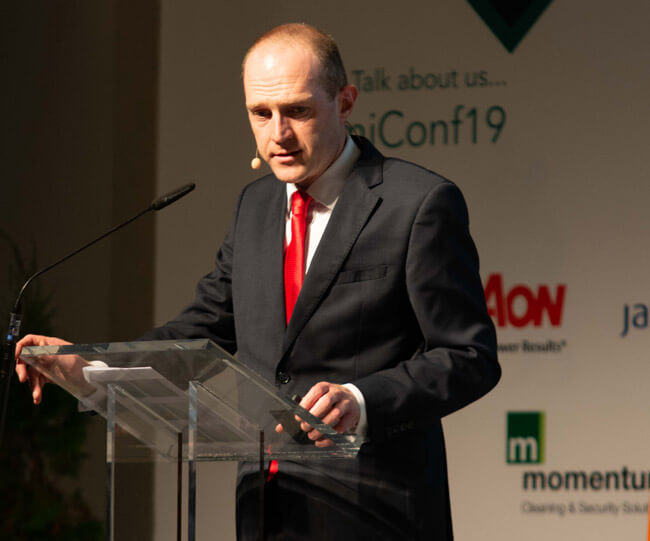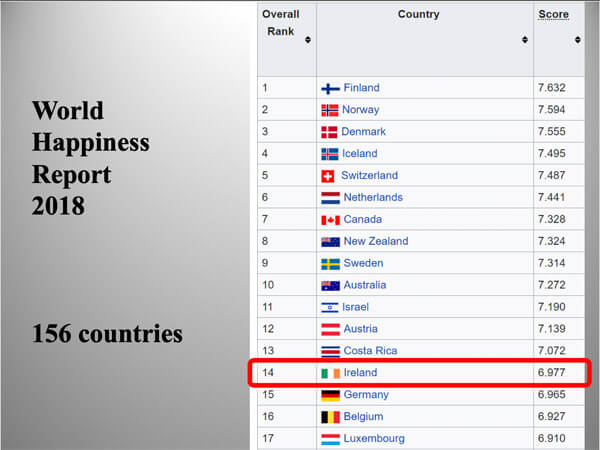Traditionally in Ireland women had always rated themselves as happier than men, but the gap had closed over the last 40 years and men were now rating themselves happier than women, Prof. Brendan Kelly, Professor of Psychiatry at Trinity College Dublin, Consultant Psychiatrist at Tallaght University Hospital and Clinical Professor at UCD School of Medicine and Medical Sciences, told the Conference.

He was speaking on, “Happiness and wellbeing among healthcare workers: What can we do?”
Prof. Kelly said different people might have quite different definitions of happiness and wellbeing. A lot of studies had been done, which tended to focus on different items, with Irish people on average rating themselves at seven on a happiness scale of one to ten. The results showed that happiness had decreased for women in recent years.
The research also showed that in most countries people started out life as reasonably happy when they were children, unless they were living in a family where there was conflict in the family home.
“It has been estimated that about half of our happiness is due to genetics, so the message is that we are not in full control of our happiness because a lot of it is out of our control
“It is absolutely clear that conflict in a family home damages children’s happiness and their future chance of happiness, so people staying together for the sake of the children must stop fighting.
“In their 20s and 30s things begin to slip for people, with the lowest happiness point being reached at 46.5 years. Those who live to their 80s and 90s and are in good health tend to be happier. They might be happy to be still alive and their priorities have probably shifted away from things like careers and other concerns of younger people.”
Prof. Kelly said there was good evidence from studies of twin babies that people inherited their propensity to be happy. “It has been estimated that about half of our happiness is due to genetics, so the message is that we are not in full control of our happiness because a lot of it is out of our control. Abut two thirds of remainder of our happiness is put down to intentional activities and about one-third to life circumstances.

“The evidence also shows that having a baby makes you happier – for two years. Unfortunately, after that you are back to where you started happiness-wise and you also have a baby.
“Some studies have been done to ask people how important marriage is to their happiness. Those who said they were happy in their marriage, were asked to nominate a sum of money they would accept to be without their marriage partner for one year.
“The average for the amount those in a happy marriage would accept to be without their partner for a year was 100,000 US dollars.”
Turning to the relationship between happiness and money, Prof. Kelly said that happiness increased as money increased, up to a maximum of about €68,000 per year. After that, incremental gains in happiness were very small, but did still increase. People who earned more than the €100 million did not seem to become notably happier, but the first million did bring increased happiness.
The relationship between money, happiness and people next door was very interesting. When people were asked if they would prefer to receive 50,000 US dollars while the people living next door received 25,000 US dollars or 100,000 US dollars while their neighbours received 200,000 US dollars, the majority opted to do themselves out of 50,000 dollars to stay ahead of the neighbours.
Both internationally and in Ireland, there is a problem about wellbeing among healthcare workers. The rates of depression were about twice as high among healthcare workers than the general population
Prof. Kelly said unemployment was bad for happiness. A 10 per cent increase in the national unemployment rate made everybody unhappy. There was a strong correlation between health and happiness and the healthier people were, the happier they were. Right wing people were happier than left wing people.
Both internationally and in Ireland, there is a problem about wellbeing among healthcare workers. The rates of depression were about twice as high among healthcare workers than the general population. One in three doctors fulfilled the criteria for burnout and about 10 per cent had problems with alcohol and drugs.
In the US the rate of suicide among the general population was 12 per 100,000 per year, but among doctors it was 28 – 40.
The risk of suicide among female health professionals in the UK was 24% higher than the female national average. This was largely explained by high suicide risk among female nurses.
In Ireland, we had lots of change in happiness ratings in recent times. Overall Irish people now ranked themselves 14th out of 156 countries on the happiness scale.
The Boorman report made a number of recommendations to promote happiness among healthcare staff. They included:
- Develop health and well-being strategies
- Focus on prevention
- Training in health and well-being should be part of performance appraisal for managers
- Particular focus on musculo-skeletal and mental health problems
- Ask staff which well-being services they value most
- Involve trade unions
However, he believed the report did not pay half enough attention to the culture of an organisation which was incredibly important in terms of wellbeing. It had been shown in scientific studies that the interventions in healthcare settings which were most effective were 15 minutes of mindfulness at the start of the shift.
It had also been shown that what staff valued most in times of difficulties was is chat with colleagues.
Prof. Kelly ended by saying that resilience was a really good concept. We all needed to be resilient. The key was a balance between resilience and a good workplace environment, eight hours sleep a night and about 150 minutes exercise a week. We should eat well, stay connected socially and manager the various depressors in life as best we could.
“Have realistic expectations, good enough is good enough, set reasonable goals for yourself, hope you have happy genes and have had a happy childhood.”
Prof. Kelly’s latest book is The Doctor Who Sat For A Year(Gill, 2019). He is also author of Hearing Voices: The History of Psychiatry in Ireland, which is just out in paperback (Irish Academic Press).

